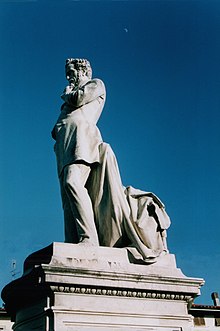Giuseppe Giusti
Giuseppe Giusti , spr. dschústi, (born May 13, 1809 in Monsummano Terme , Pistoia province , † March 31, 1850 in Florence ) was an Italian poet, satirist and politician.
Life
Giusti completed his school days at the high schools of Lucca and Pistoia . At the request of his family, he then began to study law at the University of Pisa . After graduating, he began his legal traineeship in Florence to prepare for a career as a lawyer .
Born of a sickly nature, Giusti came to the realization during this time that he was completely out of place as a lawyer. When he fell in love unhappily, he withdrew into private life and now devoted himself almost exclusively to literature.
When the Austrian Emperor Franz I died on March 2, 1835 , the poem Il dies irae (Eng. "The Day of Wrath") was published anonymously , which caused a sensation due to the unheard-of frankness of the language; Only years later did Giusti confess himself as the author of this and other anonymous works in which the prevailing political and social abuses were denounced in a bold and sharp manner.
Politically interested, Giusti was an ardent advocate of a united, independent Italy, and repeatedly addressed this in his political pamphlets and poems. In doing so, he attacked the secular and ecclesiastical nobility, as well as the "Italianissimi" and the "Utopians" as traitors of the Italian cause .
On the occasion of Ferdinand I's coronation as King of Lombardo-Venetia on September 6, 1838, Giusti published his poem "L'incoronazione". With this and in his drama "La vestizione d'un cavaliere" (1839) he attacked Ferdinand and his politics and also mocked upstart and war profiteers ; Giusti dedicated this play to the Manen Talleyrands .
For political reasons Giusti's poems only circulated in handwritten form until 1844. When an unauthorized edition was published that year, he began to revise his own works and was able to publish a collection the following year.
When on June 21, 1846 Pius IX. was elected Pope, Giusti cheered this u. a. with his writing "Il congresso de Birri", since he saw an unification of Italy with this Pope within reach. Known for his political commitment, Giusti was elected twice as a member of the Tuscan government from 1848 onwards . But when, after the overthrow of Gino Capponi's government , he blamed the anarchists for this in some pamphlets , he was voted out of office as a reactionary .
Giusti saw himself misunderstood by everyone and the pain about it made his physical ailments worse. Giusti spent his last years ailing in the house of his friend Gino Capponi in Florence and died there a few weeks before his 41st birthday on March 31, 1850.

reception
Giusti's work is still of interest today as it allows a close look at the emergence of a modern Italy. Giusti made use of the traditional Florentine dialect with great skill, especially in his poems, as he saw this language as the future language of an entire Italy.
A first complete edition was banned and destroyed for political reasons in 1852. In 1868 Giovanni Fioretto was allowed to publish some works by Giusti with comments, and Gino Capponi (1871) and Giovanni Frassi (1885) also made successful efforts to publish Giusti's works. Paul Heyse was one of the first to translate Giusti's poems into German.
Works (selection)
- Lo stivale
- L'incoronazione (1838)
- Brindisi di Girella (1840)
- Gli umanitari
- Gli immobili ed i semoventi (1841)
- Versi . Bastia 1845
- Il congresso de Birri (1846)
- Il spettri del 4 septembri (1846)
- Delenda Carthago (1848)
- Arruffa popoli (1848)
- Giovanni Fioretto (Ed.): Works . Florence 1877
- Discorso della vita e delle opere di Giuseppe Parini . Florence 1846.
- Gino Capponi (Ed.): Raccolta di proverbi toscani " . Florence 1871.
- Scritti vari in prosa e in versi (1866)
- Studi e commenti intorno alla Divina Commedia
- Nuova raccolta di scritti inediti (1868). His very interesting correspondence * Giovanni Frassi (Ed.): Epistolario. 2nd Edition. Florence 1885 (2 vol.)
- Le più belle pagine di Giuseppe Giusti scelte da Aldo Palazzeschi . Pref. di Enrico Ghidetti. Reprint of the edition Milano, Treves, 1922. Firenze: Le Lettere, 2001, ISBN 88-7166-615-1 .
- Nunzio Sabbatucci (Ed.): Opere di Giuseppe Giusti . Torino: Unione Tip.-Ed. Torinese, 1976 (Classici italiani; 89).
- Collected works, Paul Heyse . Series 5, Italian Poets in Translations. Part: 3. Three satirical poets: Giuseppe Giusti, Antonio Guadagnoli , Giuseppe G. Belli . Reprint d. der Ausg. Berlin, Hertz, 1889. Hildesheim: Olms, 1999, ISBN 3-487-10989-1 .
literature
- Stefano Adami: Giuseppe Giusti . In. Gaetana Marrone, Paolo Puppa (Eds.): Encyclopedia of Italian literary studies . Routledge, New York 2006, ISBN 1-57958-390-3 (2 vols.)
- Giovanni Fioretto: Giuseppe Giusti e il suo tempo . Verona 1877.
- G. Ghiverrani: Giusti ei suoi tempi. In: Propugnatore. 1875.
- Marilena Zeni: L'uomo poeta Giuseppe Giusti . Pacini, Pisa 1979.
Web links
- Literature by and about Giuseppe Giusti in the catalog of the German National Library
| personal data | |
|---|---|
| SURNAME | Giusti, Giuseppe |
| BRIEF DESCRIPTION | Italian comedy poet |
| DATE OF BIRTH | May 13, 1809 |
| PLACE OF BIRTH | Monsummano Terme |
| DATE OF DEATH | March 31, 1850 |
| Place of death | Florence |
